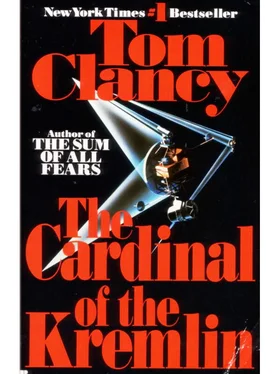Tom Clancy - The Cardinal of the Kremlin
Здесь есть возможность читать онлайн «Tom Clancy - The Cardinal of the Kremlin» весь текст электронной книги совершенно бесплатно (целиком полную версию без сокращений). В некоторых случаях можно слушать аудио, скачать через торрент в формате fb2 и присутствует краткое содержание. Год выпуска: 1988, Жанр: Триллер, на английском языке. Описание произведения, (предисловие) а так же отзывы посетителей доступны на портале библиотеки ЛибКат.
- Название:The Cardinal of the Kremlin
- Автор:
- Жанр:
- Год:1988
- ISBN:нет данных
- Рейтинг книги:3 / 5. Голосов: 1
-
Избранное:Добавить в избранное
- Отзывы:
-
Ваша оценка:
- 60
- 1
- 2
- 3
- 4
- 5
The Cardinal of the Kremlin: краткое содержание, описание и аннотация
Предлагаем к чтению аннотацию, описание, краткое содержание или предисловие (зависит от того, что написал сам автор книги «The Cardinal of the Kremlin»). Если вы не нашли необходимую информацию о книге — напишите в комментариях, мы постараемся отыскать её.
The Cardinal of the Kremlin — читать онлайн бесплатно полную книгу (весь текст) целиком
Ниже представлен текст книги, разбитый по страницам. Система сохранения места последней прочитанной страницы, позволяет с удобством читать онлайн бесплатно книгу «The Cardinal of the Kremlin», без необходимости каждый раз заново искать на чём Вы остановились. Поставьте закладку, и сможете в любой момент перейти на страницу, на которой закончили чтение.
Интервал:
Закладка:
First, the diplomats and politicians. One could discern these easily enough from their better-than-average clothing and erect posture, the ready, robotic smiles, and careful diction that endured even after the many alcoholic toasts. They were the masters, knew it, and their demeanor proclaimed it.
Second, the soldiers. One could not have arms negotiations without the men who controlled the arms, maintained them, tested them, pampered them, all the while telling themselves that the politicians who controlled the men would never give the order to launch. The soldiers in their uniforms stood mainly in little knots of homogeneous nationality and service branch, each clutching a half-full glass and napkin while blank, emotionless eyes swept the room as though searching for a threat on an unfamiliar battlefield. For that was precisely what it was to them, a bloodless battlefield that would define the real ones if their political masters ever lost control, lost temper, lost perspective, lost whatever it is in man that tries to avoid the profligate waste of young life. To a man the soldiers trusted none but one another, and in some cases trusted their enemies in different-colored uniforms more than their own soft-clothed masters. At least you knew where another soldier stood. You couldn't always say the same of politicians, even your own. They talked with one another quietly, always watching to see who listened, stopping occasionally for a quick gulp from the glass, accompanied by another look about the room. They were the victims, but also the predators – the dogs, perhaps, kept on leashes by those who deemed themselves the masters of events.
The soldiers had trouble believing that, too.
Third, the reporters. These could also be picked out by their clothing, which was always wrinkled by too many packings and unpackings in airline suitcases too small for all they carried. They lacked the polish of the politicians, and the fixed smiles, substituting for it the inquisitive looks of children, mixed with the cynicism of the dissolute. Mainly they held their glasses in their left hands, sometimes with a small pad instead of the paper napkin, while a pen was half-hidden in the right. They circulated like birds of prey. One would find someone who would talk. Others would notice and corm over to drink in the information. The casual observer could tell how interesting the information was by how quickly the reporters moved off to another source. In this sense the American and other Western reporters were different from their Soviet counterparts, who for the most part hung close to their masters like favored earls of another time, both to show their loyalty to the Party and to act as buffers against their colleagues from elsewhere. But together, they were the audience in this performance of theater in the round.
Fourth came the final group, the invisible one, those whom no one could identify in any easy way. These were the spies and the counterespionage agents who hunted them. They could be distinguished from the security officers, who watched everyone with suspicion, but from the room's perimeter, as invisible as the waiters who circulated about with heavy silver trays of champagne and vodka in crystal glasses that had been commissioned by the House of Romanov. Some of the waiters were counterespionage agents, of course. Those had to circulate through the room, their ears perked for a snippet of conversation, perhaps a voice too low or a word that didn't fit the mood of the evening. It was no easy task. A quartet of strings in a corner played chamber music to which no one appeared to listen, but this too is a feature of diplomatic receptions and doing without it would be noticed. Then there was the volume of human noise. There were well over a hundred people here, and every one of them was talking at least half the time. Those close to the quartet had to speak loudly to be heard over the music. All the resulting noise was contained in a ballroom two hundred feet long and sixty-five wide, with a parquet floor and hard stucco walls that reflected and reverberated the sound until it reached an ambient level that would have hurt the ears of a small child. The spies used their invisibility and the noise to make themselves the ghosts of the feast.
But the spies were here. Everyone knew it. Anyone in Moscow could tell you about spies. If you met with a Westerner on anything approaching a regular basis, it was the prudent thing to report it. If you did so only once, and a passing police officer of the Moscow Militia – or an Army officer strolling around with his briefcase – passed by, a head would turn, and note would be taken. Perhaps cursory, perhaps not. Times had changed since Stalin, of course, but Russia was still Russia, and distrust of foreigners and their ideas was far older than any ideology.
Most of the people in the room thought about it without really thinking about it – except those who actually played this particular game. The diplomats and politicians had practice guarding their words, and were not overly concerned at the moment. To the reporters it was merely amusing, a fabulous game that didn't really concern them – though each Western reporter knew that he or she was ipso facto thought an agent of espionage by the Soviet government. The soldiers thought about it most of all. They knew the importance of intelligence, craved it, valued it – and despised those who gathered it for the slinking things they were.
Which ones are the spies?
Of course there was a handful of people who fitted into no easily identified category – or fitted into more than one.
"And how did you find Moscow, Dr. Ryan?" a Russian asked. Jack turned from his inspection of the beautiful St. George clock.
"Cold and dark, I'm afraid," Ryan answered after a sip of his champagne. "It's not as though we have had much chance to see anything." Nor would they. The American team had been in the Soviet Union only for a little over four days, and would fly home the next day after concluding the technical session that preceded the plenary one.
"That is too bad," Sergey Golovko observed.
"Yes," Jack agreed. "If all of your architecture is this good, I'd love to take a few days to admire it. Whoever built this house had style." He nodded approvingly at the gleaming white walls, the domed ceiling, and the gold leaf. In fact he thought it overdone, but he knew that the Russians had a national tendency to overdo a lot of things. To Russians, who rarely had enough of anything, "having enough" meant having more than anyone else – preferably more than everyone else. Ryan thought it evidence of a national inferiority complex, and reminded himself that people who feel themselves inferior have a pathological desire to disprove their own perceptions. That one factor dominated all aspects of the arms-control process, displacing mere logic as the basis for reaching an agreement.
"The decadent Romanovs," Golovko noted. "All this came from the sweat of the peasants." Ryan turned and laughed.
"Well, at least some of their tax money went for something beautiful, harmless – and immortal. If you ask me, it beats buying ugly weapons that are obsolete ten years later. There's an idea, Sergey Nikolay'ch. We will redirect our political-military competition to beauty instead of nuclear weapons."
"You are satisfied with the progress, then?"
Business. Ryan shrugged and continued to inspect the room. "I suppose we've settled on the agenda. Next, those characters over by the fireplace have to work out the details." He stared at one of the enormous crystal chandeliers. He wondered how many man-years of effort had gone into making it, and how much fun it must have been to hang something that weighed as much as a small car.
"And you are satisfied on the issue of verifiability?"
Читать дальшеИнтервал:
Закладка:
Похожие книги на «The Cardinal of the Kremlin»
Представляем Вашему вниманию похожие книги на «The Cardinal of the Kremlin» списком для выбора. Мы отобрали схожую по названию и смыслу литературу в надежде предоставить читателям больше вариантов отыскать новые, интересные, ещё непрочитанные произведения.
Обсуждение, отзывы о книге «The Cardinal of the Kremlin» и просто собственные мнения читателей. Оставьте ваши комментарии, напишите, что Вы думаете о произведении, его смысле или главных героях. Укажите что конкретно понравилось, а что нет, и почему Вы так считаете.






![Александр Ирвин - Tom Clancy’s The Division 2. Фальшивый рассвет [litres]](/books/417744/aleksandr-irvin-tom-clancy-s-the-division-2-falsh-thumb.webp)





